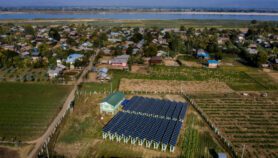By: T.V. Padma
Send to a friend
The details you provide on this page will not be used to send unsolicited email, and will not be sold to a 3rd party. See privacy policy.
[NEW DELHI] Developed countries need urgently to speed up the introduction of environmentally sound technologies to benefit the developing world, a international meeting on climate change and technology transfer has concluded.
The two-day meeting, organised by the UN Department for Economic and Social Affairs (UNDESA) and India’s Ministry of Environment and Forests, ended in New Delhi last week (23 October) with a statement on global cooperation on climate technology.
Emerging nations need climate change technologies to be deployed on a large scale — and the time that elapses between their development and their being used in developing countries should be minimised, the meeting said.
The statement is expected to be discussed at the UN Framework Convention on Climate Change (UNFCCC) summit in Copenhagen in December.
Yvo de Boer, executive secretary of the UNFCCC, reiterated his view at the New Delhi meeting that rich countries should put a ‘quick-start’ fund of US$10 billion on the table at Copenhagen to scale up the transfer of climate friendly technologies.
He added that an international action plan and financial mechanism to support technology transfer must be created — and have a long-term perspective.
In all, about US$200 billion is needed to develop technologies to cut greenhouse gas emissions, and an additional US$100 billion to help poor countries adapt to the impacts of climate change, Boer said.
"Much more clarity is needed on the exact mechanism of technology development and transfer to help developing countries," he said. "There is no point in talking about technology in the abstract without an enabling financing mechanism."
However, with just six weeks until the Copenhagen meeting, the New Delhi meeting could not decide the funding amount and mechanism, or resolve the issue of intellectual property rights (IPRs) that prevent developing countries from accessing patented technologies.
There would be further consultations on the role of IPRs, said India’s environment minister, Jairam Ramesh, in his conference summary.
Developing countries may be moving towards declaring that climate change technologies are ‘global public goods’, India’s prime minister, Manmohan Singh, said at the start of the conference.
If so, climate technologies could be subject to the same international IPR rules as some medicines: in a public health emergency, developing countries are able to issue compulsory licences to make drugs without the consent of the patent holder.













